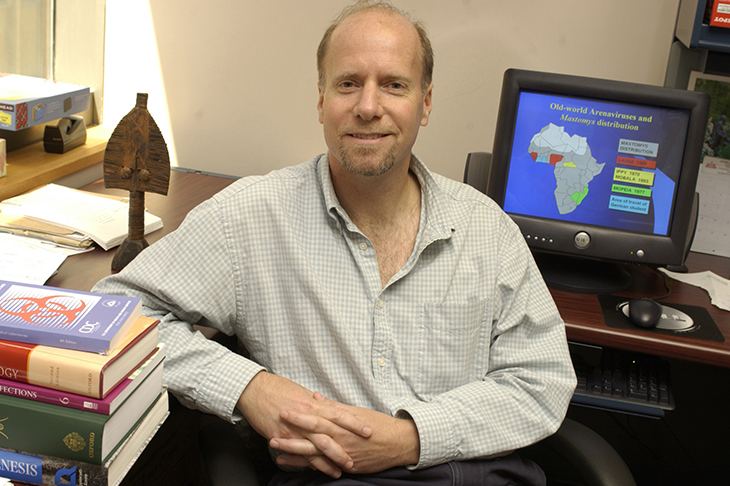How did Ebola outbreak spread?

The World Health Organization called in Dr. Daniel Bausch, an 18-year veteran in the research and control of hemorrhagic fever viruses, to consult on the ground in Guinea and Sierra Leone when the Ebola virus first began to spread. (Photo by Paula Burch-Celentano)
The ongoing outbreak of Ebola virus in Guinea, Liberia, Sierra Leone and Nigeria is the largest on record, with over 1,700 cases and a fatality rate of over 50 percent. Hemorrhagic fever specialist Dr. Daniel Bausch, an associate professor of tropical medicine in the Tulane University School of Public Health and Tropical Medicine, speculates about how the virus may have moved from its usual haunt in Central Africa to West Africa.
In a recent article in PLOS Neglected Tropical Diseases, Bausch discusses the many interrelated ecological and economic factors underlying this devastating disease, noting that countries in West Africa are at risk for increasingly severe outbreaks because of poverty, insufficient healthcare infrastructure and rudimentary governmental capacity.
“Interviews have given me an opportunity to bring attention to the gaps in the system and the steps required to gain control of this outbreak ...” -- Daniel Bausch, associate professor of tropical medicine
“Biological and ecological factors may drive emergence of the virus from the forest, but clearly the socio-political landscape dictates where it goes from there an isolated case or two or a large and sustained outbreak,” says Bausch.
Tulane University is a partner in the World Health Organization"s Global Outbreak Alert & Response Network. The WHO called in Bausch, an 18-year veteran in the research and control of hemorrhagic fever viruses, to consult on the ground in Guinea and Sierra Leone when the virus first began to spread.
Now back at his office in Lima, Peru, where he is partially seconded to the U.S. Naval Medical Research Unit, Bausch continues to consult with WHO and other partners in West Africa and serves as a subject matter expert for the international press.
“The media interest has been intense,” he says, “but the interviews have given me an opportunity to bring attention to the gaps in the system and the steps required to gain control of this outbreak and, hopefully, deal more efficiently with future ones.”
Madeline R. Vann, who received a master of public health degree in 1998 from Tulane University, is a freelance writer living in Virginia.
